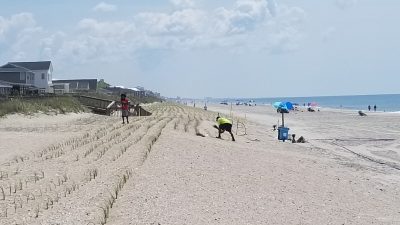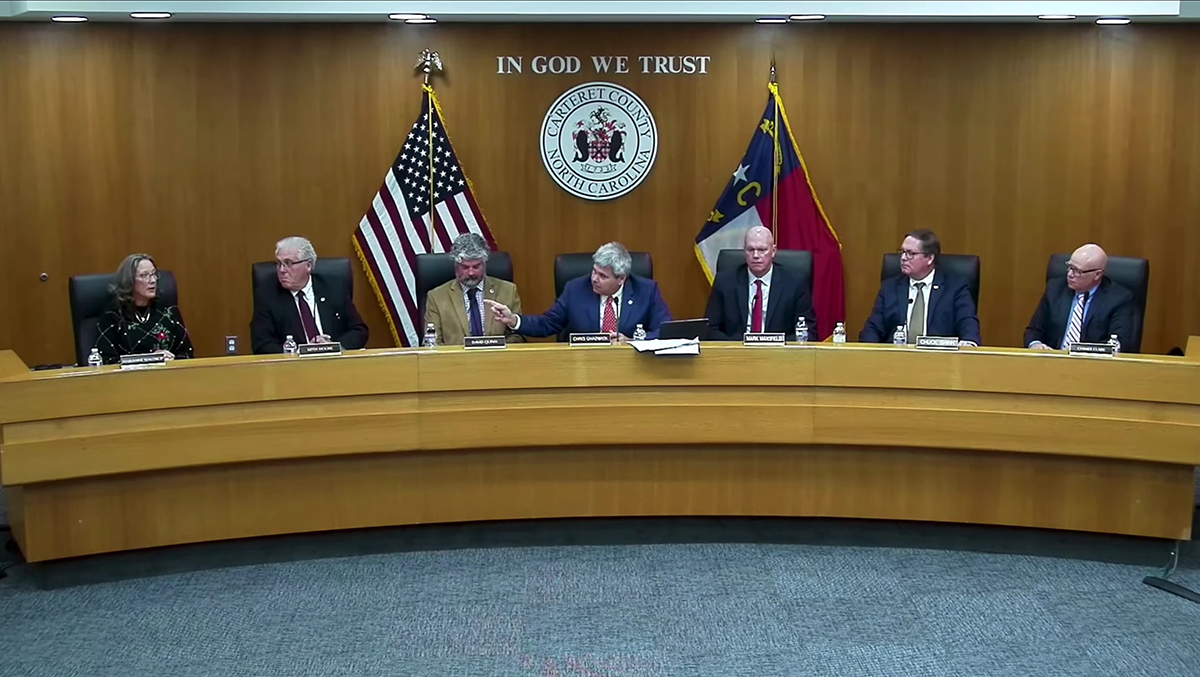
WILMINGTON – Carteret County’s freshly renourished beaches were ready for sea turtle nesting season and primed for the summer masses in the weeks leading up to Memorial Day this year.
All the heavy equipment needed to pump and push sand during the county’s post-Hurricane Florence beach renourishment project was off the ocean shore by April 30, the day before the start of the six-month-long turtle nesting season.
Supporter Spotlight
With that deadline met, the focus turned to dune planting, a key component in effectively restoring the first line of defense to properties on barrier islands.
Planting was a “little behind,” according to the May 1 update posted on the Carteret County Shore Protection Office’s website, which noted the work would likely be completed by mid to late June.
Then came a message that shore protection office officials were not expecting – the equipment being used to plant the sea oats was “heavy equipment,” according to U.S Fish and Wildlife Service and North Carolina Wildlife Resources Commission officials.
That equipment – pickup trucks, all-terrain vehicles, a mechanical planter and a 1,000-gallon watering tank on a trailer – could impact turtle nests, agency officials said.
The project wasn’t shut down, but changes had to be made in how the planting was conducted.
Supporter Spotlight
Planting was broken down into two phases. First, the mechanical planter would plant sea oats on the dune crest, but that work had to be done by the end of May. After that time, manual planting would be done along the dune slope.
The 1,000-gallon water tank was replaced with a smaller tank, one that could be pulled by an ATV. Planters watered alternately using the tank and hoses hooked to fire hydrants.

The method got the job done, but it was less efficient, said Greg “Rudi” Rudolph, Carteret County’s Shore Protection manager.
Planting was finished in late August, but the reason behind why the regulatory agencies stepped in is part of ongoing discussions and debates about whether similar projects in beach towns up and down the North Carolina coast will face more or less restrictions.
During a recent meeting of the state Coastal Resources Advisory Council, Division of Coastal Management Director Braxton Davis said the division had been working with Fish and Wildlife Service and Wildlife Resources Commission officials to get better guidance on the matter.
“We have gone ’round and ’round about this and had lots of conversations,” Davis said at the Sept. 18 meeting held in Wilmington.
The emphasis from the regulatory agencies, he said, has been about heavy equipment on the beaches during nesting season, which runs May 1 through Oct. 31.
Exactly what the agencies define as heavy equipment is a question that has so far yielded no answer.
“That’s a significant problem,” said Spencer Rogers, a member of the advisory council and a coastal geologist who serves on the science panel that advises the Coastal Resources Commission.
Rudolph, who chairs the advisory council, pointed out that pickup trucks routinely operate on beaches through nesting season for things like trash collection.
So, he asked, what’s the difference?
Kathy Matthews, a fish and wildlife biologist who oversees federal project reviews under the Endangered Species Act with service’s Raleigh field office, said the issue is “very complex.”
“We’re trying to work out some of these things,” she said. “I’m not sure if we’re going to define heavy equipment at this point.”
The agency does not have an issue with dune planting, she said, but officials would like to see plantings done in a way that avoids as many impacts to nests as possible.
“Dune planting is beneficial in the scheme of things,” Matthews said. “We would rather see the beaches stay there. Having a wide beach is beneficial for sea turtles and other wildlife. The issue is with the (Endangered Species Act).”
The 1973 act is designed to protect threatened and endangered species and their habitat.
There are various sections under the act that regulatory agencies use to set conditions for projects permitted by the Army Corps of Engineers and the state to reduce a project’s environmental damage.
A Section 7 review under the Endangered Species Act requires federal agencies to determine whether permitted projects will adversely affect the habitat of listed threatened and endangered animals and plants needed to survive and recover a species.
Corps-permitted projects are covered under this section.
Section 9 lists prohibited acts outside of a permit known as “take.” A take includes harassing, harming, pursuing, hunting, shooting, wounding, killing, trapping, capturing or collecting a listed species.
Nonfederal projects may apply for a Section 10 permit, which allows for so-called incidental takes, which are takes that result from lawful activities, such as permitted beach re-nourishment projects.
Matthews said that Section 10 is an intense permitting process, one that includes a habitat conservation plan.
“Section 10 is voluntary,” she said. “However, it provides coverage. The issue for us and, I think for the state, that if something should happen there is no coverage. Right now, we are trying to look at multiple avenues for covering it.”
Agency officials are considering not only the size of the equipment being used on the beaches, but also the size of the project.
“I do think there’s a difference between dune planting between a 1,000-foot stretch or 1,500-foot stretch and 10 miles of beach,” she said.
The state, along with federal regulatory agencies, rolled out less than two years ago North Carolina’s statewide programmatic biological opinion, which was created to fast-track the permitting process for standard beach renourishment projects.
Rudolph said he does not want the process to get to the point where dune planting is done outside of a federal permit. Instead, he contends, the statewide program should be amended to include dune planting that is part of a federally permitted project.
“To be clear, I very much support that,” Davis said.
The council unanimously voted to urge the Division of Coastal Management to be an advocate for getting regulatory agencies to authorize mechanical planting equipment on beaches during the summer planting season.
“They’re summer plants and they have to be planted in the summer season,” Rogers said. “These projects are going to keep coming up. DCM needs to be an advocate to find a way to make this work.”







